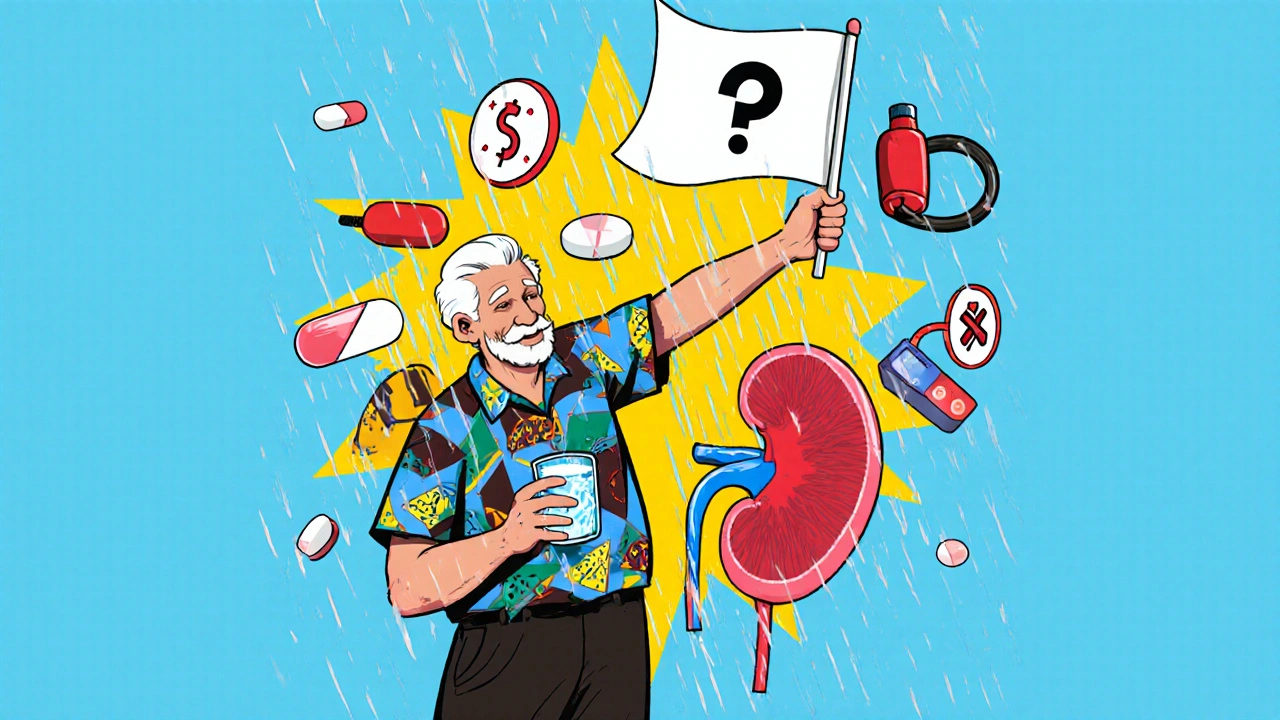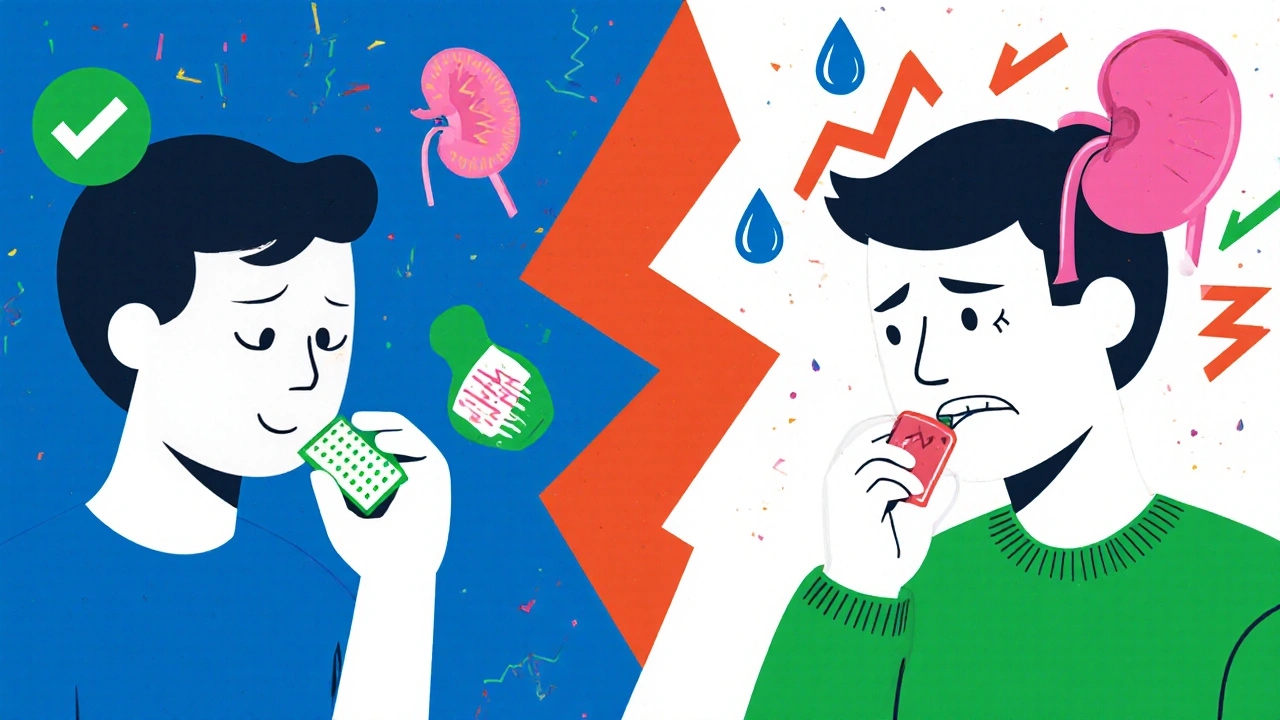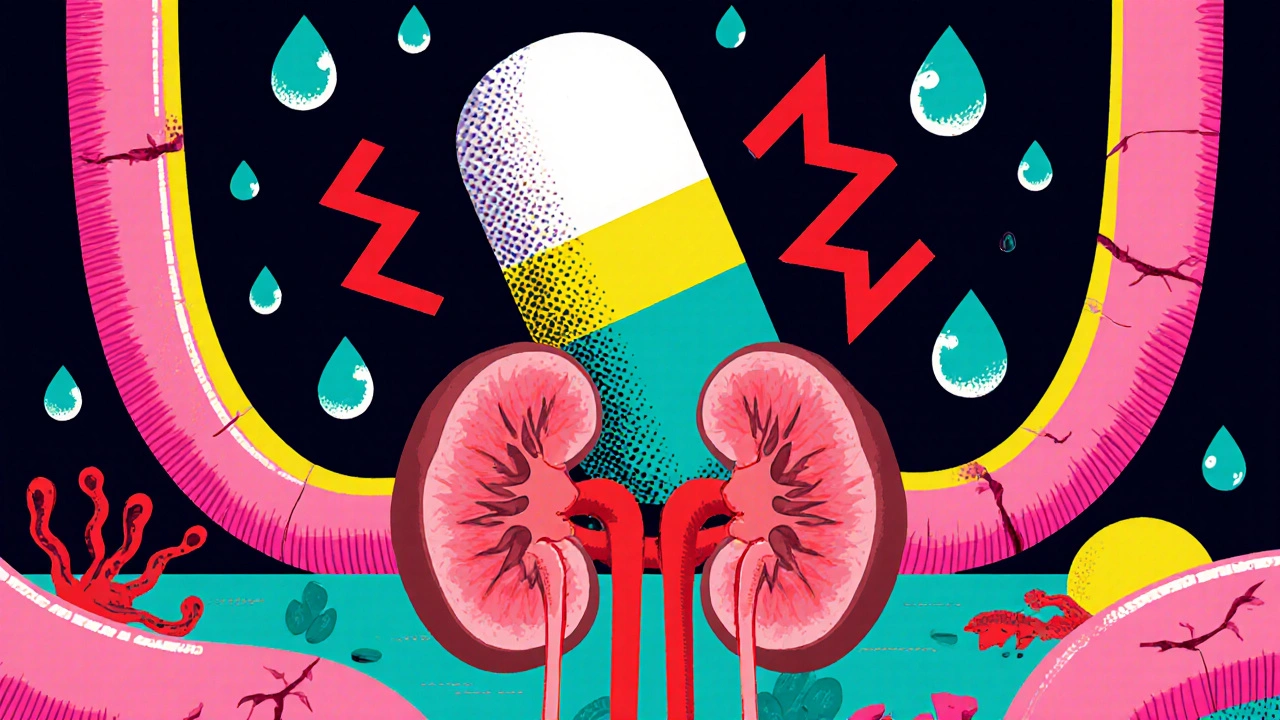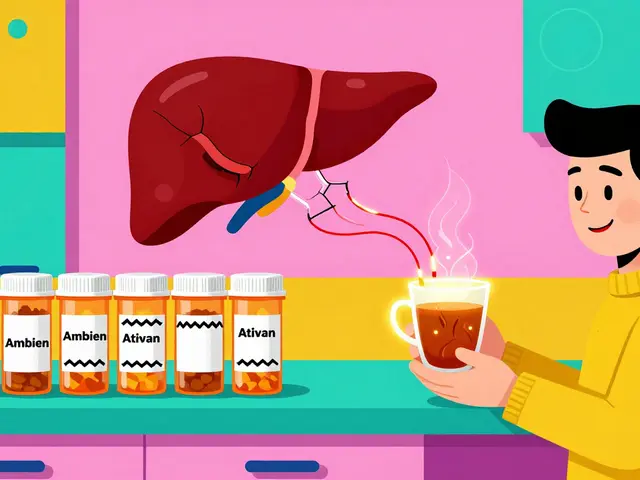Many people reach for aspirin without thinking twice-headache, fever, or even aches from standing all day. But if you have kidney issues or are at risk, that little white pill might be doing more harm than good. Aspirin isn’t just a simple pain reliever. It’s a powerful drug that affects your blood, your stomach, and yes-your kidneys. And most people don’t realize how deeply it can interfere with kidney function, especially when taken regularly or in high doses.
How aspirin affects your kidneys
Your kidneys don’t just filter waste. They also help control blood pressure, balance fluids, and produce hormones that keep your body running smoothly. Aspirin, like other NSAIDs (nonsteroidal anti-inflammatory drugs), works by blocking enzymes called COX-1 and COX-2. These enzymes help make prostaglandins-chemicals that keep blood flowing to your kidneys. When aspirin lowers prostaglandin levels, your kidneys get less blood. That’s fine for a healthy person occasionally. But if you already have reduced kidney function, that drop in blood flow can push your kidneys into crisis mode.
Studies show that regular aspirin use (three or more times a week) is linked to a higher risk of chronic kidney disease, especially in people over 60. One 2023 analysis of over 120,000 adults found that long-term aspirin users had a 20% higher chance of declining kidney function compared to non-users. It’s not a guarantee, but it’s a real risk. And the damage isn’t always obvious. You might not feel anything until your kidneys are already significantly impaired.
Who’s most at risk?
Not everyone who takes aspirin will hurt their kidneys. But some people are far more vulnerable:
- People with existing kidney disease (even mild)
- Those with diabetes or high blood pressure
- Older adults (65+)
- People taking diuretics or ACE inhibitors
- Anyone who’s dehydrated or has low blood volume
Dehydration is a silent danger. If you’re sweating a lot, not drinking enough water, or have had diarrhea, your kidneys are already working harder. Add aspirin on top, and you’re cutting off their blood supply just when they need it most. This can lead to acute kidney injury-even in people who never had kidney problems before.
One case from a Perth hospital in early 2025 involved a 72-year-old man who took two 100mg aspirin daily for heart health and another two for arthritis pain. He didn’t feel sick, but his creatinine levels jumped 40% in two weeks. He’d been drinking less water because he thought he didn’t need much. His kidneys bounced back after stopping aspirin and rehydrating, but it was a close call.
Aspirin for heart protection: is it worth the risk?
Many people take low-dose aspirin (75-100mg daily) to prevent heart attacks or strokes. That’s still recommended for some-especially those with a history of cardiovascular disease. But guidelines have changed. In 2024, the American Heart Association and the Australian Heart Foundation both updated their advice: aspirin is no longer routinely recommended for healthy adults over 70 without prior heart issues.
Why? Because the risk of bleeding and kidney damage outweighs the benefit for most people in that group. If you’re on daily aspirin for heart protection, don’t stop without talking to your doctor. But do ask: Is it still right for me? Are there safer alternatives? Are my kidneys being monitored?
Doctors now recommend checking kidney function (with a simple blood test for creatinine and eGFR) before starting aspirin-and at least once a year if you’re already taking it long-term.

Alternatives to aspirin for pain and inflammation
If you’re taking aspirin for pain, you have options that are gentler on your kidneys:
- Paracetamol (acetaminophen): This is usually the first choice for people with kidney concerns. It doesn’t affect kidney blood flow like aspirin does. But don’t exceed 3,000mg a day-too much can damage your liver.
- Physical therapy and heat/cold therapy: For joint or muscle pain, movement and compression can be more effective long-term than pills.
- Topical NSAIDs: Gels or creams like diclofenac applied to the skin deliver pain relief with much less impact on the kidneys than swallowing a pill.
- Low-dose corticosteroids (under supervision): For inflammatory conditions like arthritis, these can be safer than daily NSAIDs if used short-term and carefully.
Don’t assume that "natural" remedies are safer. Some herbal supplements, like willow bark (which contains salicin, a compound similar to aspirin), can have the same kidney risks. Always check with your pharmacist before trying anything new.
Signs your kidneys might be affected
Kidney damage often happens quietly. But watch for these red flags:
- Swelling in your ankles, feet, or hands
- Frequent urination, especially at night
- Fatigue or trouble concentrating
- Nausea or loss of appetite
- High blood pressure that’s suddenly harder to control
These symptoms can be caused by many things-but if you’re taking aspirin regularly and notice any of them, get your kidney function tested. A simple blood test can show if your kidneys are struggling.

What to do if you’re on aspirin
If you take aspirin daily, here’s what to do right now:
- Check your last kidney test results. If you haven’t had one in over a year, schedule one.
- Review your dosage. Are you taking more than prescribed? Are you combining it with other painkillers?
- Stay hydrated. Drink water regularly, especially if you’re active or in hot weather.
- Ask your doctor: "Is this still necessary? Are there safer options?"
- Never stop aspirin suddenly if it’s for heart protection-this can trigger a clot.
Many people keep taking aspirin out of habit, not because it’s still needed. A 2024 study found that 38% of older adults on daily aspirin had no medical reason to continue it. A quick chat with your GP could save your kidneys.
Final thought: Aspirin isn’t harmless
Aspirin saved lives when it was first introduced. But medicine evolves. What was once seen as a miracle cure is now understood as a tool with serious trade-offs. Your kidneys are hardworking organs. They don’t complain until they’re overwhelmed. Don’t assume that because aspirin is available over the counter, it’s safe for daily use-especially if you’re over 60, have diabetes, or already have high blood pressure.
Ask yourself: Why am I taking this? Is it still helping? Could something else work just as well-with less risk? The answer might not be obvious, but asking the question could make all the difference.
Can aspirin cause kidney damage even if I don’t have kidney disease?
Yes. Even people with healthy kidneys can experience temporary kidney injury from aspirin, especially if they’re dehydrated, taking high doses, or using it long-term. Acute kidney injury from aspirin is rare but possible. Chronic use over years increases the risk of permanent decline in kidney function.
Is low-dose aspirin safe for kidney health?
Low-dose aspirin (75-100mg) carries less risk than higher doses, but it’s not risk-free. For people with existing kidney disease, diabetes, or high blood pressure, even low doses can reduce kidney blood flow enough to cause harm. The benefit for heart protection must be weighed against kidney risk-always with medical guidance.
What pain reliever is safest for kidneys?
Paracetamol (acetaminophen) is generally the safest oral pain reliever for people with kidney concerns, as long as you don’t exceed the daily limit (3,000mg). Topical NSAID gels are also a good option for localized pain. Avoid ibuprofen, naproxen, and other NSAIDs if your kidneys are already compromised.
How often should I get my kidneys checked if I take aspirin?
If you take aspirin daily and are over 60, have diabetes, or high blood pressure, get a kidney blood test (creatinine and eGFR) at least once a year. If you’ve had kidney issues before, your doctor may recommend testing every 6 months. Don’t wait for symptoms-damage can be silent.
Can I stop aspirin if I’m worried about my kidneys?
If you’re taking aspirin for heart protection, never stop abruptly-it can trigger a heart attack or stroke. Talk to your doctor first. They may suggest switching to another medication or adjusting your dose. If you’re taking aspirin only for pain, you can usually stop safely, but still consult your doctor to find a better alternative.



November 16, 2025 AT 23:13 PM
My dad’s been on low-dose aspirin since his stent in 2018. Doctor says keep going, but his eGFR dropped from 72 to 58 last year. He swears he’s hydrated and eats clean. I’m starting to wonder if it’s the aspirin or just aging. Either way, he’s getting a blood test next week.
November 17, 2025 AT 03:47 AM
Let me guess-Big Pharma doesn’t want you to know that aspirin is just a cover for their real agenda: kidney destruction so they can sell you dialysis machines and transplant drugs. They’ve been doing this since the 80s. Remember when Tylenol was ‘safe’? Now it’s the #1 cause of liver failure. Same playbook. They push these pills like candy, then act shocked when your organs give out. And don’t even get me started on the FDA’s cozy relationship with the pharmaceutical lobby. You think they care about your kidneys? They care about quarterly profits. You’re being played. Wake up.
November 18, 2025 AT 19:07 PM
As a registered nurse with 22 years in nephrology, I can confirm that the risks outlined in this post are not only accurate but understated. Chronic NSAID use-including aspirin-is one of the most preventable causes of progressive kidney disease in older adults. I’ve seen patients with eGFRs below 30 who were taking two aspirin daily for ‘inflammation’ and didn’t realize they were harming themselves. Paracetamol remains the gold standard for analgesia in renal impairment, provided liver function is monitored. Always consult your provider before initiating or continuing any OTC medication long-term. Prevention is infinitely preferable to intervention.
November 19, 2025 AT 21:21 PM
It’s strange how we treat medicine like a moral choice. We say aspirin is ‘bad’ for kidneys, but we don’t ask why we feel compelled to take it at all. Is it pain? Or is it the fear of being vulnerable? We medicate silence, discomfort, aging-everything we refuse to sit with. Maybe the real issue isn’t the pill. It’s the culture that tells us we must fix everything with a chemical.
November 20, 2025 AT 20:49 PM
Okay but let’s be real-this whole ‘aspirin kills kidneys’ narrative is just a distraction from the real villain: processed food and sedentary lifestyles. You think your kidneys are failing because of one pill? Nah. It’s the high-fructose corn syrup in your soda and the 12-hour desk job. People want simple answers, so they blame aspirin. Meanwhile, their sodium intake is through the roof and they haven’t walked more than 500 steps in a week. Fix your diet first. Then worry about the pill.
November 22, 2025 AT 14:37 PM
So… aspirin bad. Paracetamol good. Got it. I’ll just stop taking it. 😴
November 23, 2025 AT 05:15 AM
I’ve been taking 81mg daily since I was 55 for ‘heart health.’ I’m 68 now. I’ve had two heart attacks, three stents, and my wife says I’m a walking time bomb. But you know what? I don’t feel like a time bomb. I feel like a guy who’s still alive because he took the damn pill. And now you want me to stop? For what? So I can die quietly from a clot while you all nod wisely from your yoga mats? My kidneys are fine. My creatinine’s 1.0. My eGFR’s 65. I’m not some fragile old man-I’m a survivor. You want to take away my insurance policy? Fine. But don’t pretend you know what’s in my chest better than I do.
November 23, 2025 AT 22:52 PM
There’s something beautiful about how medicine keeps changing. Aspirin was once hailed as a miracle. Now it’s a cautionary tale. And yet-we still take it. Not because we’re stupid, but because we’re human. We want control. We want to fix things before they break. But kidneys? They don’t scream. They whisper. And by the time you hear them, it’s too late. Maybe the real lesson isn’t about aspirin. It’s about listening-to your body, to your doctor, to the quiet things you ignore until they’re gone.
November 24, 2025 AT 19:47 PM
Oh wow. A whole article about aspirin and kidneys and not a single mention of the fact that your doctor probably prescribed it because they got a free lunch from a pharma rep? 🤡 Let me guess-your ‘eGFR’ test was done in a clinic that’s owned by the same company that makes the aspirin. You’re being sold a narrative. Don’t be the guy who takes the pill and then thanks the guy who gave it to him. Wake up. The system doesn’t care if your kidneys live or die. It cares if your insurance bill gets paid.
November 25, 2025 AT 11:25 AM
In India, many elders take aspirin daily without any medical advice. I’ve seen grandfathers with diabetes and hypertension take two tablets a day for decades. They don’t know what eGFR means. But they know their bodies. Some are fine. Some aren’t. The real issue is access to care, not the pill itself. If we could make kidney tests as common as blood pressure checks, we could prevent so much harm. Education-not fear-is the answer.
November 27, 2025 AT 07:51 AM
For those considering stopping aspirin: please consult your physician before doing so, especially if it was prescribed for cardiovascular protection. Abrupt discontinuation can increase the risk of thrombotic events. If you’re uncertain about your current regimen, request a medication review. Your provider can help determine whether the benefits still outweigh the risks based on your current health status, lab values, and lifestyle factors. You deserve personalized care-not blanket advice from the internet.
November 28, 2025 AT 05:45 AM
Look-I get it. Aspirin’s not harmless. But if you’re over 60 and your doc says ‘take one a day,’ don’t be the guy who Googles ‘aspirin kidney damage’ and then quits cold turkey. That’s not bravery, that’s stupidity. Do the test. Get the numbers. Talk to your doctor. If they say ‘keep going,’ trust them. If they say ‘maybe not,’ then pivot. But don’t let fear make your decisions for you. Your kidneys are tough. But so are you. Just don’t be reckless.
November 30, 2025 AT 04:21 AM
I’m 58, diabetic, and take 81mg aspirin daily. My eGFR is 62, which my nephrologist says is ‘stable for my age.’ I don’t take it for pain-I take it because I had a silent heart attack at 52. I don’t want to die young. I’ve switched to paracetamol for headaches, and I drink water like it’s my job. This post helped me feel less alone. Thank you.
December 1, 2025 AT 08:39 AM
They’re lying. Aspirin doesn’t cause kidney damage. It’s the glyphosate in your bread, the fluoride in your water, the 5G towers, and the microchips in your vaccines. The FDA knows this. The WHO knows this. But they won’t tell you because they’re paid by Monsanto and the Illuminati. Your kidneys are fine. Your mind? That’s what they’re trying to break. Stop taking the pill? No. Stop taking the lies. Start researching the real enemy.